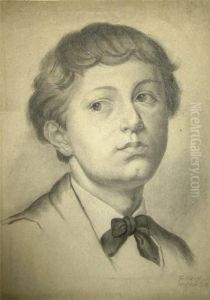Carl Barth Paintings
Carl Heinrich Barth was a German pianist, composer, and music educator born on July 12, 1847, in Pillau, Prussia (now Baltiysk, Russia). He is less known for his compositions and more recognized for his contributions to music education and his role in the musical life of Berlin during the late 19th and early 20th centuries.
Barth studied music at the prestigious Leipzig Conservatory under Ignaz Moscheles, who was a notable pianist and composer of his time. After completing his studies, Barth embarked on a career as a concert pianist. He performed extensively throughout Europe, gaining a reputation for his interpretations of the works of Beethoven and other classical composers. Despite his success as a performer, he gradually shifted his focus towards teaching, which would become his most enduring legacy.
In 1871, Carl Barth was appointed as a piano teacher at the Stern Conservatory in Berlin. His teaching methods and philosophy influenced a generation of pianists. He emphasized a clear and singing tone, precise technique, and musical expression. Barth was known to be a strict but fair teacher, and his students included a number of future luminaries in the world of music.
Barth's career as an educator took a significant turn when he joined the faculty of the Royal Academy of Arts in Berlin in 1880, where he served as a professor until his death. His influence extended beyond the classroom as he was involved in the musical community of Berlin, participating in various musical societies and contributing to the city's vibrant cultural life.
Carl Barth's compositions include works for piano and a number of songs. While his compositions have not entered the standard repertoire, they reflect the musical tastes and styles of his era. His legacy is primarily that of a teacher, with many of his students going on to have successful careers in music.
Barth passed away on October 23, 1916, in Berlin. His contributions to music education, particularly piano pedagogy, continued to be felt long after his death through the work of his students and the pedagogical traditions he helped to establish.
